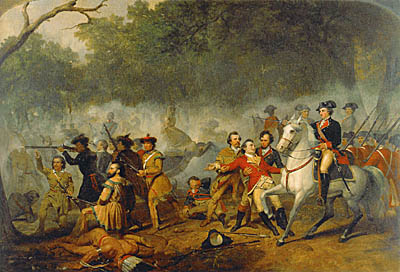« 50 Years of Spaced Out. | Main | The Economist: America, bin Laden & killing abroad. »
May 06, 2011
Sensitive Litigation Moment No. 7: The Holy Surprise of Rule 56(d), Fed. R. Civ. P.

Disruptive as Hell: The "early-in-case" Rule 56 motion (note well-dressed Brit GC after taking a bullet here).
(d) When Facts Are Unavailable to the Nonmovant. If a nonmovant shows by affidavit or declaration that, for specified reasons, it cannot present facts essential to justify its opposition, the court may:
(1) defer considering the motion or deny it;
(2) allow time to obtain affidavits or declarations or to take discovery; or
(3) issue any other appropriate order.If a party opposing the motion shows by affidavit that, for specified reasons, it cannot present facts essential to justify its opposition, the court may:
Another Sensitive Litigation Moment. Trial lawyers know that Rule 56 of the Federal Rules of Civil Procedure, or summary judgment, gives a litigant an opportunity to win on its claims or dispose of the opponent's claims relatively quickly and without trial. Accompanied by sworn affidavits, and most often discovery responses, a Rule 56 motion tries to show that there is no real dispute about key facts and that the movant is entitled to judgment under the law.
If the trial court grants it, the movant wins on those claims.
But what if a summary judgment motion is brought against your client--suddenly and out of the blue--and the local rules (or local folkways and practices) of the district court don't give you much time to develop and prepare an opposition. After all, Rule 56 lets a party who has brought a claim file for summary judgment after 20 days, and defendants can file "at any time".
In contentious, high stakes litigation, a quick summary judgment motion right after the commencement of a lawsuit can be extraordinarily disruptive--no matter how it is resolved by the district court. It will fluster even the most battle-hardened-been-there-seen-that GC or in-house counsel.
And it's an expensive little sideshow, too.
Subdivision (d) of Rule 56, "When Facts Are Unavailable to the Nonmovant", provides a safeguard against premature grants of SJ. Lots of good lawyers seem either to not know about--or to not use--subdivision (d) of Rule 56.
In short, you file your own motion and affidavit--there are weighty sanctions if you misuse the rule, so be careful--stating affidavits by persons with knowledge needed to oppose the motion are "not available", and stating why.
The district court can then (1) deny the request and make you oppose the motion, (2) refuse to grant the motion for SJ OR do what you really want it to do: (3) grant a continuance so that you can develop facts and, better yet, take depositions or conduct other discovery.
Granted, it's a delay-oriented rule, but if used correctly, Rule 56(d) can give you the breathing room and time you need to develop the client's case, and avoid the granting of summary judgment against it.
Note: An ATL reader caught our mistake in failing to recognize the renumbering and rewording of Rule 56(f) to 56(d) by the Advisory Committee. We appreciate it--and the correctly numbered subdivisions should now appear above. The crux of subdivision (f) was carried forward into (d), effective December 1, 2010. Thanks, sir. You are correct if pseudo-anonymous. But we were wrong.
Posted by JD Hull at May 6, 2011 11:59 PM
Comments
You're right. New (d) is a reworking and re-wording of old (f); and we knew better. It happened on 12/1/10. The "affidavits" language was always archaic. Thanks for pointing it out. We'll fix it. The principle is the same--but there is nothing like acknowledging the re-wording and renumbering. You screw up with boilerplate. And we screwed up using pre-December 2010 posts.
Posted by: Dan Hull at May 7, 2011 12:51 AM
I think you need to double check your Fed. R. Civ. P. again. Rule 56(f) states: "Judgment Independent of the Motion. After giving notice and a reasonable time to respond, the court may:
(1) grant summary judgment for a nonmovant;
(2) grant the motion on grounds not raised by a party; or
(3) consider summary judgment on its own after identifying for the parties material facts that may not be genuinely in dispute."
I think you meant to talk about Fed. R. Civ. P. 56(d):"When Facts Are Unavailable to the Nonmovant. If a nonmovant shows by affidavit or declaration that, for specified reasons, it cannot present facts essential to justify its opposition, the court may:
(1) defer considering the motion or deny it;
(2) allow time to obtain affidavits or declarations or to take discovery; or
(3) issue any other appropriate order."
Posted by: S.U. Sasskuash at May 6, 2011 11:38 PM
Post a comment
Thanks for signing in, . Now you can comment. (sign out)
(If you haven't left a comment here before, you may need to be approved by the site owner before your comment will appear. Until then, it won't appear on the entry. Thanks for waiting.)